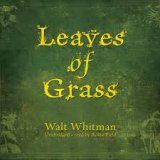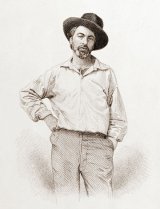Leaves of Grass Page #2
Leaves of Grass is a poetry collection by the American poet Walt Whitman (1819–1892). Although the first edition was published in 1855, Whitman spent most of his professional life writing and re-writing Leaves of Grass, revising it multiple times until his death. This resulted in vastly different editions over four decades—the first, a small book of twelve poems and the last, a compilation of over 400.
Exalte, rapt, ecstatic, The visible but their womb of birth, Of orbic tendencies to shape and shape and shape, The mighty earth-eidolon. All space, all time, (The stars, the terrible perturbations of the suns, Swelling, collapsing, ending, serving their longer, shorter use,) Fill'd with eidolons only. The noiseless myriads, The infinite oceans where the rivers empty, The separate countless free identities, like eyesight, The true realities, eidolons. Not this the world, Nor these the universes, they the universes, Purport and end, ever the permanent life of life, Eidolons, eidolons. Beyond thy lectures learn'd professor, Beyond thy telescope or spectroscope observer keen, beyond all mathematics, Beyond the doctor's surgery, anatomy, beyond the chemist with his chemistry, The entities of entities, eidolons. Unfix'd yet fix'd, Ever shall be, ever have been and are, Sweeping the present to the infinite future, Eidolons, eidolons, eidolons. The prophet and the bard, Shall yet maintain themselves, in higher stages yet, Shall mediate to the Modern, to Democracy, interpret yet to them, God and eidolons. And thee my soul, Joys, ceaseless exercises, exaltations, Thy yearning amply fed at last, prepared to meet, Thy mates, eidolons. Thy body permanent, The body lurking there within thy body, The only purport of the form thou art, the real I myself, An image, an eidolon. Thy very songs not in thy songs, No special strains to sing, none for itself, But from the whole resulting, rising at last and floating, A round full-orb'd eidolon. For Him I Sing For him I sing, I raise the present on the past, (As some perennial tree out of its roots, the present on the past,) With time and space I him dilate and fuse the immortal laws, To make himself by them the law unto himself. When I Read the Book When I read the book, the biography famous, And is this then (said I) what the author calls a man's life? And so will some one when I am dead and gone write my life? (As if any man really knew aught of my life, Why even I myself I often think know little or nothing of my real life, Only a few hints, a few diffused faint clews and indirections I seek for my own use to trace out here.) Beginning My Studies Beginning my studies the first step pleas'd me so much, The mere fact consciousness, these forms, the power of motion, The least insect or animal, the senses, eyesight, love, The first step I say awed me and pleas'd me so much, I have hardly gone and hardly wish'd to go any farther, But stop and loiter all the time to sing it in ecstatic songs. Beginners How they are provided for upon the earth, (appearing at intervals,) How dear and dreadful they are to the earth, How they inure to themselves as much as to any--what a paradox appears their age, How people respond to them, yet know them not, How there is something relentless in their fate all times, How all times mischoose the objects of their adulation and reward, And how the same inexorable price must still be paid for the same great purchase. To the States To the States or any one of them, or any city of the States, Resist much, obey little, Once unquestioning obedience, once fully enslaved, Once fully enslaved, no nation, state, city of this earth, ever afterward resumes its liberty. On Journeys Through the States On journeys through the States we start, (Ay through the world, urged by these songs, Sailing henceforth to every land, to every sea,) We willing learners of all, teachers of all, and lovers of all. We have watch'd the seasons dispensing themselves and passing on, And have said, Why should not a man or woman do as much as the seasons, and effuse as much? We dwell a while in every city and town, We pass through Kanada, the North-east, the vast valley of the Mississippi, and the Southern States, We confer on equal terms with each of the States, We make trial of ourselves and invite men and women to hear, We say to ourselves, Remember, fear not, be candid, promulge the body and the soul, Dwell a while and pass on, be copious, temperate, chaste, magnetic, And what you effuse may then return as the seasons return, And may be just as much as the seasons. To a Certain Cantatrice Here, take this gift, I was reserving it for some hero, speaker, or general, One who should serve the good old cause, the great idea, the progress and freedom of the race, Some brave confronter of despots, some daring rebel; But I see that what I was reserving belongs to you just as much as to any. Me Imperturbe Me imperturbe, standing at ease in Nature, Master of all or mistress of all, aplomb in the midst of irrational things, Imbued as they, passive, receptive, silent as they, Finding my occupation, poverty, notoriety, foibles, crimes, less important than I thought, Me toward the Mexican sea, or in the Mannahatta or the Tennessee, or far north or inland, A river man, or a man of the woods or of any farm-life of these States or of the coast, or the lakes or Kanada, Me wherever my life is lived, O to be self-balanced for contingencies, To confront night, storms, hunger, ridicule, accidents, rebuffs, as the trees and animals do. Savantism Thither as I look I see each result and glory retracing itself and nestling close, always obligated, Thither hours, months, years--thither trades, compacts, establishments, even the most minute, Thither every-day life, speech, utensils, politics, persons, estates; Thither we also, I with my leaves and songs, trustful, admirant, As a father to his father going takes his children along with him. The Ship Starting Lo, the unbounded sea, On its breast a ship starting, spreading all sails, carrying even her moonsails. The pennant is flying aloft as she speeds she speeds so stately-- below emulous waves press forward, They surround the ship with shining curving motions and foam. I Hear America Singing I hear America singing, the varied carols I hear, Those of mechanics, each one singing his as it should be blithe and strong, The carpenter singing his as he measures his plank or beam, The mason singing his as he makes ready for work, or leaves off work, The boatman singing what belongs to him in his boat, the deckhand singing on the steamboat deck, The shoemaker singing as he sits on his bench, the hatter singing as he stands, The wood-cutter's song, the ploughboy's on his way in the morning, or at noon intermission or at sundown, The delicious singing of the mother, or of the young wife at work, or of the girl sewing or washing, Each singing what belongs to him or her and to none else,
Translation
Translate and read this book in other languages:
Select another language:
- - Select -
- 简体中文 (Chinese - Simplified)
- 繁體中文 (Chinese - Traditional)
- Español (Spanish)
- Esperanto (Esperanto)
- 日本語 (Japanese)
- Português (Portuguese)
- Deutsch (German)
- العربية (Arabic)
- Français (French)
- Русский (Russian)
- ಕನ್ನಡ (Kannada)
- 한국어 (Korean)
- עברית (Hebrew)
- Gaeilge (Irish)
- Українська (Ukrainian)
- اردو (Urdu)
- Magyar (Hungarian)
- मानक हिन्दी (Hindi)
- Indonesia (Indonesian)
- Italiano (Italian)
- தமிழ் (Tamil)
- Türkçe (Turkish)
- తెలుగు (Telugu)
- ภาษาไทย (Thai)
- Tiếng Việt (Vietnamese)
- Čeština (Czech)
- Polski (Polish)
- Bahasa Indonesia (Indonesian)
- Românește (Romanian)
- Nederlands (Dutch)
- Ελληνικά (Greek)
- Latinum (Latin)
- Svenska (Swedish)
- Dansk (Danish)
- Suomi (Finnish)
- فارسی (Persian)
- ייִדיש (Yiddish)
- հայերեն (Armenian)
- Norsk (Norwegian)
- English (English)
Citation
Use the citation below to add this book to your bibliography:
Style:MLAChicagoAPA
"Leaves of Grass Books." Literature.com. STANDS4 LLC, 2024. Web. 21 Dec. 2024. <https://www.literature.com/book/leaves_of_grass_23>.




Discuss this Leaves of Grass book with the community:
Report Comment
We're doing our best to make sure our content is useful, accurate and safe.
If by any chance you spot an inappropriate comment while navigating through our website please use this form to let us know, and we'll take care of it shortly.
Attachment
You need to be logged in to favorite.
Log In